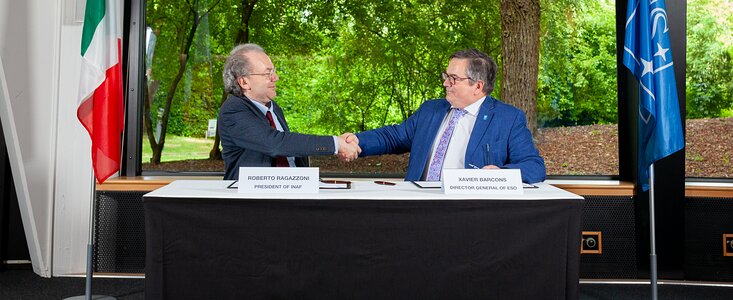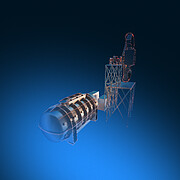Announcement
ESO signs agreement for ANDES instrument on the ELT
5 June 2024
Today, ESO has signed an agreement with an international consortium of institutions for the design and construction of ANDES, the ArmazoNes high Dispersion Echelle Spectrograph. The ANDES instrument will be installed on ESO’s Extremely Large Telescope (ELT). It will be used to search for signs of life in exoplanets and look for the very first stars, as well as to test variations of the fundamental constants of physics and measure the acceleration of the Universe’s expansion.
The agreement was signed by ESO’s Director General, Xavier Barcons, and by Roberto Ragazzoni, the President of Italy’s National Institute for Astrophysics (INAF), the institution leading the ANDES consortium. Also attending the signing ceremony were Sergio Maffettone, Consul General of Italy in Munich, and INAF’s Alessandro Marconi, ANDES Principal Investigator, in addition to other representatives from ESO, INAF, the ANDES consortium and the Consulate of Italy in Munich. The signing took place at the ESO Headquarters in Garching, Germany.
Formerly known as HIRES, ANDES is a powerful spectrograph: an instrument which splits light into its component wavelengths so astronomers can determine important properties about astronomical objects, such as their chemical compositions. The instrument will have a record-high wavelength precision in the visible and near-infrared regions of light and, when working in combination with the powerful mirror system of the ELT, it will pave the way for research spanning multiple areas of astronomy.
“ANDES is an instrument with an enormous potential for groundbreaking scientific discoveries, which can deeply affect our perception of the Universe far beyond the small community of scientists,” says Marconi. Céline Péroux, the project scientist of the ESO team following up on ANDES, adds that the science cases range “from potentially detecting signatures of life in other worlds and identifying the very first generation of stars, to studying the variations in the fundamental constants of physics.”
ANDES will conduct detailed surveys of the atmospheres of Earth-like exoplanets, allowing astronomers to search extensively for signs of life. It will also be able to analyse chemical elements in faraway objects in the early Universe, making it likely to be the first instrument capable of detecting signatures of Population III stars, the earliest stars born in the Universe. In addition, astronomers will be able to use ANDES data to test whether the fundamental constants of physics vary with time and space. Its comprehensive data will also be used to directly measure the acceleration of the Universe’s expansion, one of the most pressing mysteries about the cosmos.
ESO’s ELT is currently under construction in the Atacama Desert of Northern Chile. When operations start later this decade, the ELT will be the world’s biggest eye on the sky, marking a new age in ground-based astronomy.
More Information
The ANDES project is developed by an international consortium composed of research institutes in 13 countries. They are:
- Brazil: Board of Stellar Observational Astronomy, Universidade Federal do Rio Grande do Norte, Observatório Nacional.
- Canada: Observatoire du Mont-Mégantic and the Trottier Institute for Research on Exoplanets, Université de Montréal.
- Denmark: Instrument Centre for Danish Astrophysics on behalf of Niels Bohr Institute, Aarhus University, Danmarks Tekniske Universitet.
- France: Centre National de la Recherche Scientifique (CNRS) on behalf of Observatoire de la Côte d’Azur, Université Côte d’Azur (LAGRANGE), Laboratoire d’Astrophysique de Marseille, Aix-Marseille Université, Centre National d’Etudes Spatiales (LAM), Institut de Recherche en Astrophysique et Planetologie, Université Toulouse III-Paul Sabatier (IRAP), Institut de Planétologie et d’Astrophysique de Grenoble, Université Grenoble-Alpes (IPAG), Laboratoire Univers et Particules de Montpellier, Université de Montpellier (LUPM), Institut d’Astrophysique de Paris, Sorbonne Université (IAP), Laboratoire de Météorologie Dynamique, Ecole Normale Supérieure, Ecole Polytechnique, Sorbonne Université (LMD).
- Germany: Leibniz-Institut für Astrophysik Potsdam (AIP), Institut für Astrophysik und Geophysik, Georg-August-Universität Göttingen (IAG), Atmospheric Physics of Exoplanets Department, Max-Planck-Institut für Astronomie Heidelberg (MPIA), Zentrum für Astronomie, Universität Heidelberg (ZAH), Thüringer Landessternwarte Tautenburg (TLS), Hamburger Sternwarte, Universität Hamburg (UHH).
- Italy: INAF, Istituto Nazionale di Astrofisica (Lead Technical Institute).
- Poland: Nicolaus Copernicus University in Torun.
- Portugal: Instituto de Astrofísica e Ciências do Espaço (IA) at Centro de Investigaço em Astronomia/Astrofísica da Universidade do Porto (CAUP), Instituto de Astrofísica e Ciências do Espaço at Faculdade de Ciências da Universidade de Lisboa, Associação para a Investigação e Desenvolvimento de Ciências (FCiências.ID)
- Spain: Instituto de Astrofísica de Canarias (IAC); Consejo Superior de Investigaciones Científicas (CSIC, Spain) on behalf of Instituto de Astrofísica de Andalucía (IAA), Centro de Astrobiología de Madrid (CSIC-INTA).
- Sweden: Lund University, Stockholm University, Uppsala University.
- Switzerland: Département d’Astronomie, Université de Genève; Weltraumforschung und Planetologie, Physikalisches Institut, Universität Bern.
- United Kingdom: Science and Technology Facilities Council, United Kingdom Research and Innovation on behalf of Cavendish Laboratory & Institute of Astronomy, University of Cambridge; UK Astronomy Technology Centre; Institute of Photonics and Quantum Sciences, Heriot-Watt University.
- USA: Department of Astronomy, University of Michigan.
Links
Contacts
Alessandro Marconi
ANDES Principal Investigator
Department of Physics and Astronomy, University of Florence, Italy
INAF-Arcetri Astrophysical Observatory, Italy
Email: alessandro.marconi@inaf.it, alessandro.marconi@unifi.it
Céline Péroux
ESO Project Scientist for ANDES
Email: cperoux@eso.org
Juan Carlos Muñoz Mateos
ESO Media Officer
Garching bei München, Germany
Tel: +49 89 3200 6176
Email: press@eso.org
About the Announcement
| Id: | ann24010 |
Our use of Cookies
We use cookies that are essential for accessing our websites and using our services. We also use cookies to analyse, measure and improve our websites’ performance, to enable content sharing via social media and to display media content hosted on third-party platforms.
ESO Cookies Policy
The European Organisation for Astronomical Research in the Southern Hemisphere (ESO) is the pre-eminent intergovernmental science and technology organisation in astronomy. It carries out an ambitious programme focused on the design, construction and operation of powerful ground-based observing facilities for astronomy.
This Cookies Policy is intended to provide clarity by outlining the cookies used on the ESO public websites, their functions, the options you have for controlling them, and the ways you can contact us for additional details.
What are cookies?
Cookies are small pieces of data stored on your device by websites you visit. They serve various purposes, such as remembering login credentials and preferences and enhance your browsing experience.
Categories of cookies we use
Essential cookies (always active): These cookies are strictly necessary for the proper functioning of our website. Without these cookies, the website cannot operate correctly, and certain services, such as logging in or accessing secure areas, may not be available; because they are essential for the website’s operation, they cannot be disabled.
Functional Cookies: These cookies enhance your browsing experience by enabling additional features and personalization, such as remembering your preferences and settings. While not strictly necessary for the website to function, they improve usability and convenience; these cookies are only placed if you provide your consent.
Analytics cookies: These cookies collect information about how visitors interact with our website, such as which pages are visited most often and how users navigate the site. This data helps us improve website performance, optimize content, and enhance the user experience; these cookies are only placed if you provide your consent. We use the following analytics cookies.
Matomo Cookies:
This website uses Matomo (formerly Piwik), an open source software which enables the statistical analysis of website visits. Matomo uses cookies (text files) which are saved on your computer and which allow us to analyze how you use our website. The website user information generated by the cookies will only be saved on the servers of our IT Department. We use this information to analyze www.eso.org visits and to prepare reports on website activities. These data will not be disclosed to third parties.
On behalf of ESO, Matomo will use this information for the purpose of evaluating your use of the website, compiling reports on website activity and providing other services relating to website activity and internet usage.
Matomo cookies settings:
Additional Third-party cookies on ESO websites: some of our pages display content from external providers, e.g. YouTube.
Such third-party services are outside of ESO control and may, at any time, change their terms of service, use of cookies, etc.
YouTube: Some videos on the ESO website are embedded from ESO’s official YouTube channel. We have enabled YouTube’s privacy-enhanced mode, meaning that no cookies are set unless the user actively clicks on the video to play it. Additionally, in this mode, YouTube does not store any personally identifiable cookie data for embedded video playbacks. For more details, please refer to YouTube’s embedding videos information page.
Cookies can also be classified based on the following elements.
Regarding the domain, there are:
- First-party cookies, set by the website you are currently visiting. They are stored by the same domain that you are browsing and are used to enhance your experience on that site;
- Third-party cookies, set by a domain other than the one you are currently visiting.
As for their duration, cookies can be:
- Browser-session cookies, which are deleted when the user closes the browser;
- Stored cookies, which stay on the user's device for a predetermined period of time.
How to manage cookies
Cookie settings: You can modify your cookie choices for the ESO webpages at any time by clicking on the link Cookie settings at the bottom of any page.
In your browser: If you wish to delete cookies or instruct your browser to delete or block cookies by default, please visit the help pages of your browser:
Please be aware that if you delete or decline cookies, certain functionalities of our website may be not be available and your browsing experience may be affected.
You can set most browsers to prevent any cookies being placed on your device, but you may then have to manually adjust some preferences every time you visit a site/page. And some services and functionalities may not work properly at all (e.g. profile logging-in, shop check out).
Updates to the ESO Cookies Policy
The ESO Cookies Policy may be subject to future updates, which will be made available on this page.
Additional information
For any queries related to cookies, please contact: pdprATesoDOTorg.
As ESO public webpages are managed by our Department of Communication, your questions will be dealt with the support of the said Department.


